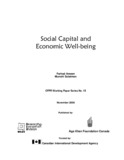Social capital and economic well-Being

View/
Date
2006-11Publisher
BRAC Research and Evaluation Division and Aga Khan Foundation CanadaMetadata
Show full item recordAbstract
Sociologists and economists increasingly consider ‘social capital’ a valuable component in the asset endowment of households, improving productivity and enhancing economic well-being. Like physical and human capital, social capital is viewed as a critical factor in economic development. This paper tests the proposition that social capital expands household welfare by estimating the effects of social interactions on per capita expenditure among a sample of 810 households in northern Bangladesh. Using data from BRAC’s 2004 Social Capital Survey, Ordinary Least Square (OLS) estimates isolate the differential effects of physical assets, human capital, and social capital. The results show a statistically significant positive association between ‘informal’ social networks and household per capita expenditure, after controlling for physical assets, human capital, and regional differences. The link between ‘formal’ social capital – membership in organizations, groups and committees – and per capita expenditure is less clear. On average, membership is positively related to household expenditure; however, such membership does not necessarily yield positive benefits for the ultra-poor, a result that requires further exploration. Although it is too early to fully evaluate the impact of BRAC’s ‘Challenging the Frontiers of Poverty Reduction/Targeting the Ultra-poor’ (CFPR/TUP) program, the findings raise important questions for programs seeking to develop ‘induced social capital’ for the ultra-poor. In particular, attention needs to be placed on the costs and benefits of informal and formal social interactions. Using indicators of quality of informal relations with neighbours and relatives, this paper forms an index of horizontal social capita to see whether it affects well-being. To investigate causality, trust was used as instrumental variables. Controlling a number of variables a strong positive influence of social relationships on economic well-being was found. However, the influence of income on social relation was not significant. On the question of how does social relation matter, social relation is correlated with the extent of conflict in the villages, informal insurance mechanism and flow of information. Probably for the ultra-poor who live solely by selling labour in the informal labour market, getting work more frequently through informal relations is one of the most important channels of benefit flow.
